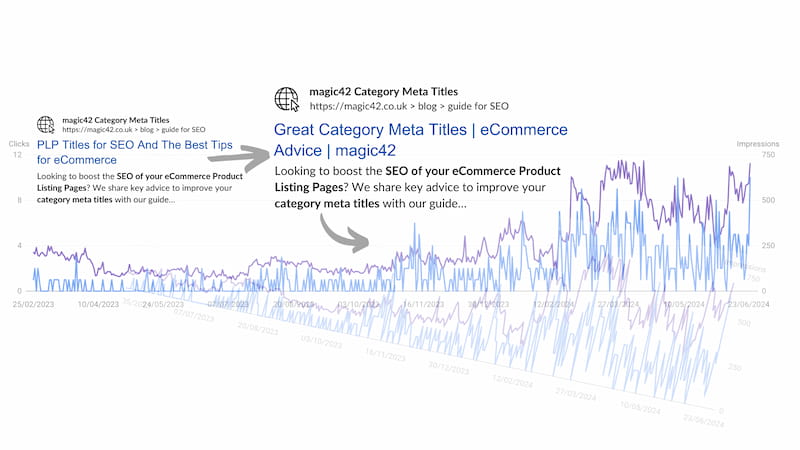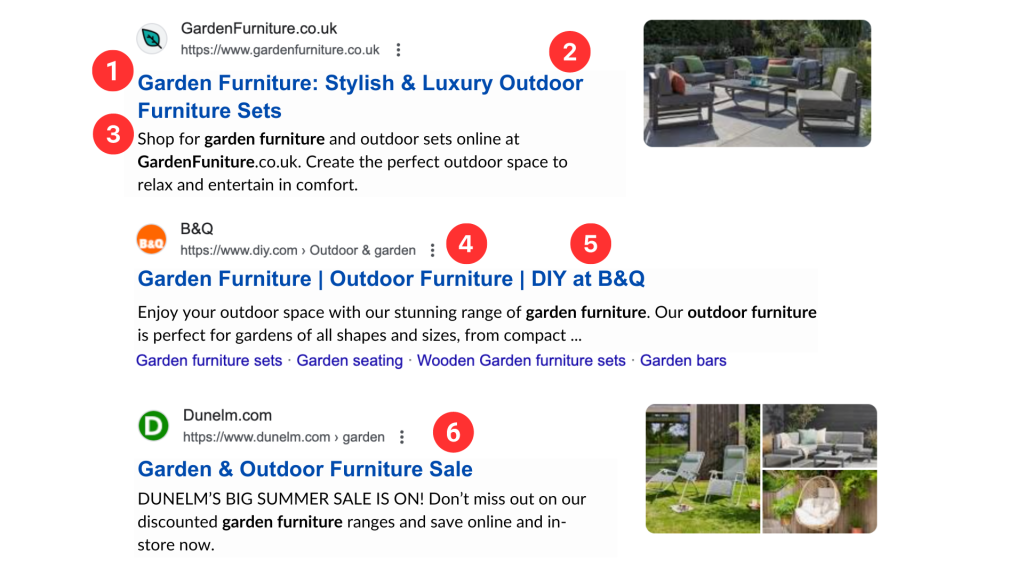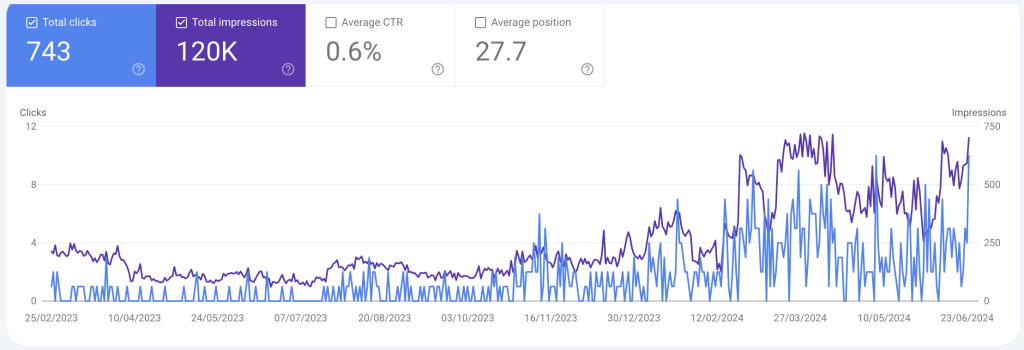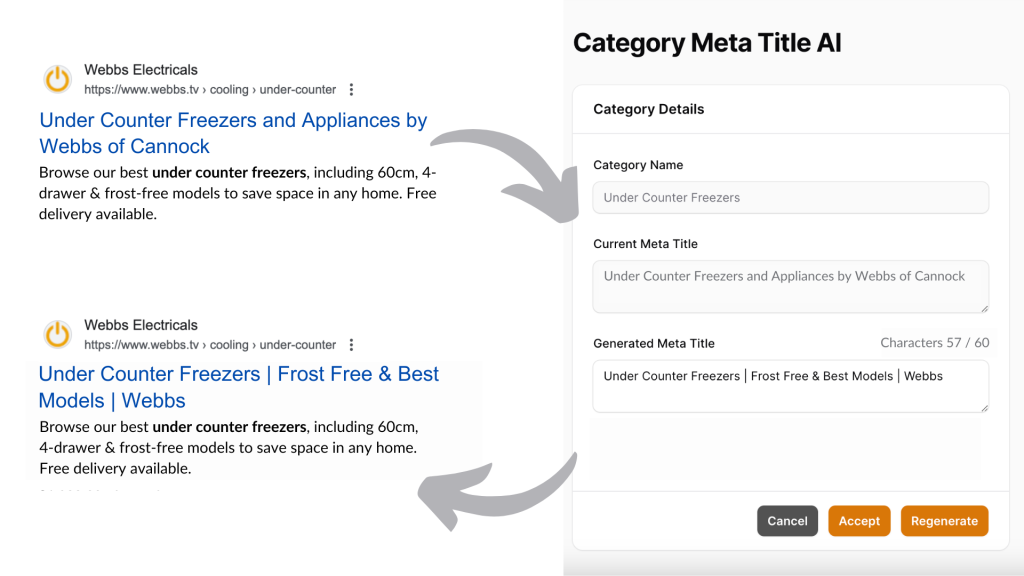
eCommerce category meta titles are vital in attracting customers to your collection of products. However, they can be slightly more difficult to optimise when compared to their product meta title counterparts. After all, they need to take into consideration a collection of products and match keywords to customer search queries for an entire Product Listing Page (PLP).
Any category meta title can be amended in your platform’s Content Management System (CMS), ultimately showing in Search Engine Results Pages (SERPs). In turn, this could help boost visibility of the page and traffic to your website. All it takes is a bit of time and analysis, just as you would for writing great titles to encourage click-throughs for Google Ads, email marketing and more.
So, to help you understand how to optimise eCommerce category meta titles for PLPs effectively, we’ve broken down key areas to focus on and why.
We’ve picked out three examples of category meta titles or PLP titles used by other eCommerce businesses, highlighting their importance and what techniques they’ve used. We’ll be looking at the key search term ‘garden furniture’:

The primary keyword phrase is ‘Garden Furniture’, which is useful to use in the meta title to match the category title in Search Engine Result Pages (SERPs). However, every eCommerce business will be using this phrase and competing in search results. As meta titles have a 60 character limit, it’s important to use the rest of the space for related keywords…
The second part of the title uses synonyms or other keywords and phrases customers will be using, such as ‘Outdoor Furniture Sets’ and prefixes like ‘Luxury’. ‘Stylish’ may also help match the category in search engines, but may not rank as highly as it’s on its own and not what is known as a ‘longtail’ keyphrase, such as ‘Luxury Outdoor Furniture Sets’.
The meta description will often compliment the meta title. Whilst we won’t go too in-depth into meta descriptions here, it’s worth noting that a call to action can be useful in the meta title. Phrases such as ‘Buy’, ‘Browse’ or ‘Shop’ can incite an action if used at the start of the meta title, but are usually best suited in the meta description where there is more space to utilise.
The main category keyword phrase and alternative keyword phrase have been split using a pipe. This not only helps the title match against search queries, but also makes it easier to read and saves space in the title.
Using the business brand name at the end of the meta title can help it rank for customers searching for that eCommerce business. However, this can take up valuable space in the meta title. GardenFurniture.co.uk have opted to have this in their meta description, instead.
‘Sale’ is a popular search phrase and can help boost visibility if used in the meta title, next to the category keywords. This creates a sense of urgency, as this is often for a limited time only. Other related phrases, such as ‘discounted’ or ‘deals’, have a similar impact but better serve the category all-year around.
Customers will be searching for keywords and synonyms, but this shouldn’t be a guessing game. You can often find out what phrases customers are using to find your categories by using Google Search Console. Armed with the most searched keywords and the above information, you could optimise your category meta information accordingly.
To not optimise your meta titles would mean to hurt your search engine result rankings. Unless a customer is looking specifically for your brand, your category page results could be pushed several pages back in favour of other competitor results using more searched-for keywords.
Typically, eCommerce sites will have auto-generated PLP meta titles (the category name + parent category name + site name or category name + site name). Whilst this may not necessarily be bad, you are likely missing out on opportunities to improve that category page’s organic traffic. This is even more so if your keywords have never been optimised at all.
Taking the time to amend category meta titles is important. As a reminder, if you spend the time optimising your search ads (Google Ads) and email subject lines for click-through rates, then why wouldn’t you do the same for site SEO? That includes your category pages.
It’s worth noting that search engine rankings don’t shoot up overnight though, as Google has to index the page, evaluate search results and plenty more, which takes time. However, with careful monitoring, the page rankings will hopefully change over the coming weeks and months. They may be marginal, but they can make all the difference with increased visibility and sales.

A key problem is that optimising each and every PLP meta title is time-consuming. It’s worth doing for more click-throughs, traffic and sales, sure, but is difficult to do at scale. After all, you need to do keyword research, optimise each category page, then monitor their results.
Enter AI in eCommerce.
Using AI, it is possible to optimise product and category meta titles at speed. However, AI needs to reference real-world information to provide a decent quality output, meaning such a tool would need to be integrated with your own data to be useful.
We have developed an AI-featured tool that integrates with your website platform, giving it access to necessary product and category information. Using its integration to Google Search Console data, it can then filter keywords around customer search queries and use these to optimise your existing product and category meta information. This streamlines the process of scouring 100s-1000s of keywords and entering them in category meta titles in your Magento, Shopify or WooCommerce sites.

Through using AI in eCommerce, it becomes possible to tailor your meta titles swiftly and with the quality needed to improve your SEO. When it comes to our tool, that’s because each prompt has been keenly written and tailored by human copywriters to best help eCommerce businesses. Through these complex prompts, matching your tone of voice and referencing specific information, our AI app can produce a high calibre output at scale.
Our eCommerce AI app can help optimise your category meta titles based on your existing info. We share more details on AI in eCommerce in our blog - five ways we enhance products using our AI app.
Alternatively, find out how to enhance your SEO directly with our eCommerce AI app.


